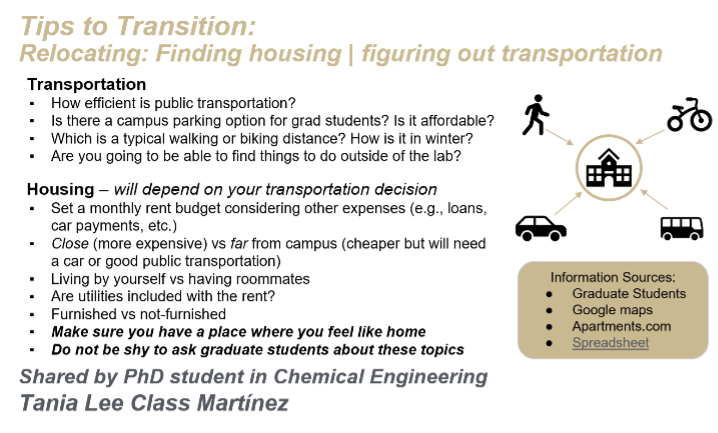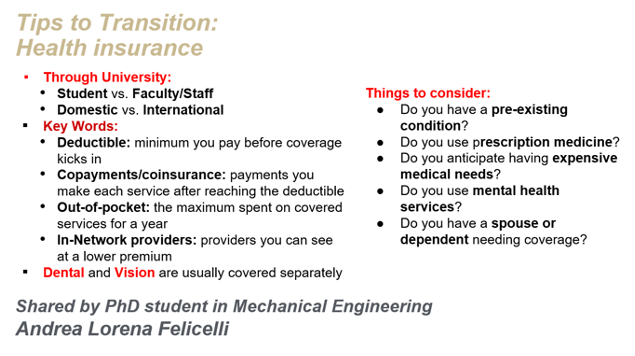Transitioning for success
You've probably already realized graduate school has its own vocabulary and maybe you feel silly asking what different words or acronyms mean... well then this information is for you! Review the information below to learn more about graduate school jargon and how graduate school differs from your undergraduate experience.
Ask if you can start your graduate program early (BRIDGE Program)
- Perform research the summer before starting your graduate studies
- Get acclimated to the area early
- Choose housing
- Jump start your research training
- Build connections
- Get Paid!
Google "X University Graduate Bridge Program" to learn whether your university has this. Can't find anything? Email your PI and/or graduate program to learn what options might exist.
What Orientation and Trainings are needed?:
- Departmental Orientation (virtual or in person)
- Graduate School Orientation
- Define expectations with research group
- Trainings: Responsible Conduct of Research (RCR/CITI), equipment trainings, hazardous materials, etc?
All universities and graduate programs should have a graduate program handbook. SAVE THIS to your computer and READ IT when you start. The graduate program handbook has rules that apply to you (dates, deadlines, requirements) and are helpful to demystify your experience in the program.
Things to consider when re-locating and looking for an apartment:
Location, distance from your research group on campus, public transportation, monthly price, deposit, is there an application fee?, lease term, square foot area, cost of utilities (water, trash and sewer, electricity, gas, heat, internet (and speed)), A/C, parking, appliances (microwave, dishwasher, furnished), on call/on-site maintenance?

Terms that everyone uses (Graduate School Jargon)
Graduate School Exams
You can expect to ask about the following exams as you start in your doctoral program:
- Every program has an exam of some sort, and these go by many names such as, Cumulative Exams (Cumes), Comprehensive Exams (Comps), Preliminary Exams (Prelims), General Exams (Generals/GEs) and Qualifying Exams (Quals). These exams, which can be written and/or oral, are given by most graduate programs with the general purpose of making sure the student understands his/her discipline well enough in order to conduct their own independent research in their field. The specifics of these exams are dependent on each program, but they can range from focusing only on the students research topic to expecting the student to understand a wider range of topics (credit to: Caffeinated Confidence).
- Dissertation - This written document should include all of the work that you completed in your PhD (both published and unpublished). Typically, it is multiple chapters. The first will be your intro and the final chapter will be your conclusion. Most Universities have templates and require specific formatting.
- Defense - typically an oral presentation to your committee (sometimes also open to the public). Your defense will be a recap of the work you completed during your PhD, followed by Q&A; and a closed door committee meeting (~1hr) where you are asked questions pertaining to your work.
Committee - You will develop your committee as you complete exams and benchmarks in your graduate program. Your committee is made of faculty members, can be both internal and external to your university, and includes your research advisor. Members of your committee should help guide your research project in meaningful ways and can be other excellent faculty mentors. You should plan to meet with your committee at least once a year and your committee will also be present and ask you questions at your defense.
Transitioning from Master's to PhD track - if you complete your Master's level coursework and decide that you would like to continue on for your PhD, then typically you can wrap up your master?s as a non-thesis master?s and transfer your courses and research directly to your PhD study. You should definitely check with your department and university, but this is a fairly common practice.
Pass through Master's degree - If you came into a direct-PhD program, it is common that you will complete all courses required for a non-thesis MS degree on your journey to PhD. If so, many universities will allow you to obtain a pass through MS degree (non-thesis MS).
The alphabet soup of trainings and programs - The Collaborative Institutional Training Initiative (CITI Program), Responsible Conduct of Research (RCR), The Family Educational Rights and Privacy Act (FERPA), and Institutional Review Boards (IRB) are just some of the acronyms that you will encounter as a graduate student in STEM.
Becoming a PhD Candidate - Once you complete all of the required coursework and exams for your program, you then move from "PhD Student" to "PhD Candidate." Check in with your program to understand what is required for this!
Developing your Professional Profile - In addition to LinkedIn, once you start publishing, you will want to set up a few different professional profiles:
- Google Scholar Profiles - a way for researchers to showcase their academic publications. You can check who is citing your articles, graph citations over time, and compute several citation metrics. You can also make your profile public, so that it may appear in Google Scholar results when people search for your name,
- ORCID ID - a digital identifier that distinguishes you from every other researcher. The ORCID is a nonproprietary alphanumeric code to uniquely identify authors and contributors of scholarly communication as well as ORCID's website and services to look up authors and their bibliographic output.
- Researchgate - discover knowledge and stay connected to your scientific community
- Do not underestimate the power of social media in developing your research and professional profile! Understand how your PI and lab use their professional social media (website, Twitter, YouTube, LinkedIn, etc...)
What is tenure?
Tenure - an academic appointment for a faculty member. Typically, Assistant Professors are pre-tenure and have not completed the 5 -7 year tenure review process (timing can vary by institution). Typically, Associate Professors or Full Professors have completed the tenure process and are therefore tenured. Tenured faculty have indefinite academic appointments that can only be terminated under the most extenuating circumstances. Learn more about tenure here: https://www.aaup.org/issues/tenure
How does tenure affect graduate students? If you join a research group with a faculty member who is pre-tenure, then you should have a conversation regarding what would happen the faculty member does not achieve tenure at that institution.
Money Management
Check out the resources below to manage your money as a graduate student.
Another great resource for personal finance is here: https://www.reddit.com/r/personalfinance/wiki/index
Banking and Budgeting - Consider the following for banking:
- Physical or Online Banking
- Checking and Savings accounts
- Big Banks versus local banks or credit unions
It is important to think about building your credit responsibly.
Consider the following for budgeting so that you know where your money is going:
- Use a budgeting app that syncs to your bank (Mint, PocketGuard, etc...)
- Make sure that you have a safety net (recommended to have 3-6months of expenses).
- Expect that the unexpected will happen, and budget your money for this!
Learn how to budget during Grad School here: https://graduatedebris.com/how-to-budget-during-grad-school/
Use a budget calculator with help from the Council of Graduate Schools (CGS): https://gradsense.org/gradsense/budget-calculator
Taxes
Your graduate student salary or national fellowship might be subject to taxes. You should consult a tax professional or service to determine the appropriate course regarding taxes.
Health Insurance
Check with your graduate program and university to understand your graduate student health insurance benefits. If you have any questions, be sure to reach out to your administrators and/or human resources.
Learn more about deductibles, co-payments, out of pocket expenses and in-network providers in the adjacent image. There are many important things to consider when determining what insurance works best for you.

